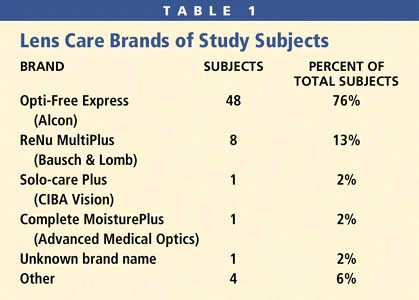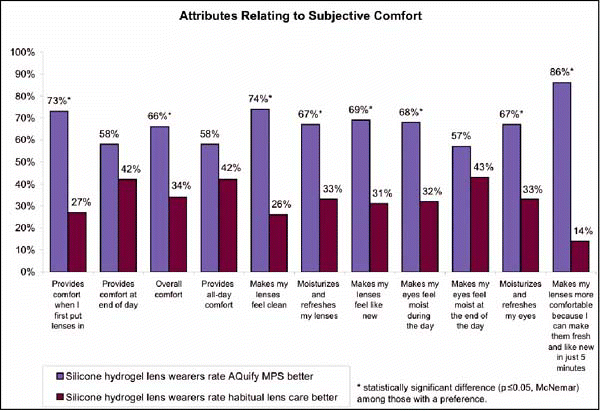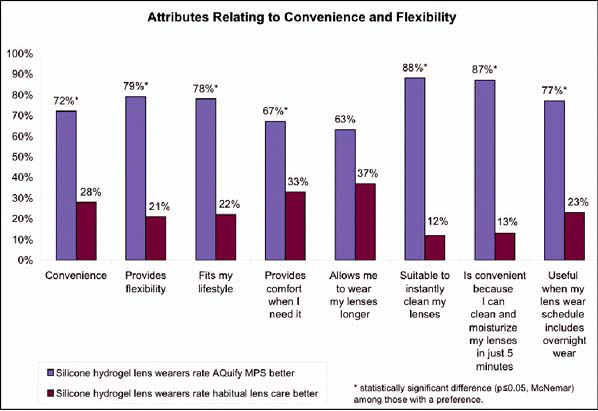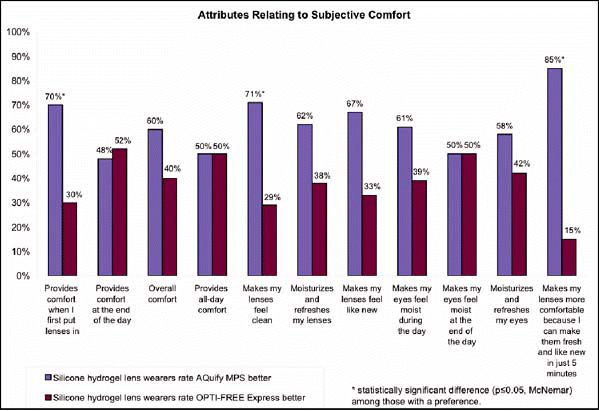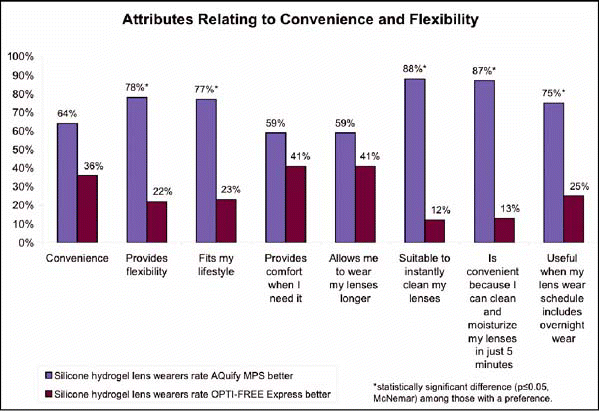Multipurpose Solution Use with Silicone Hydrogel Contact Lenses
Practitioners are increasingly prescribing silicone hydrogel contact lenses for daily and flexible wear schedules as they consider silicone hydrogels to be the lenses of choice for more and more patients. In addition to new fits, practitioners are refitting many patients who wear traditional hydrogels for daily and flexible wear into silicone hydrogels. Currently, silicone hydrogel lenses account for more than 30 percent and 25 percent of lenses prescribed for new daily wear fits in the United States and Canada, respectively.
In many cases, patients who've been upgraded into silicone hydrogel lenses will continue to use their existing lens care products. However, recent evidence suggests that certain multipurpose solutions can interact with various silicone hydrogel lens materials and result in varying levels of corneal staining. We undertook a study to explore patient experience and ocular response to use of silicone hydrogels with CIBA Vision's Aquify Multi-Purpose Solution (Aquify MPS), which is indicated for use with silicone hydrogel lens materials.
Need for Solution Compatibility
Patients who continue to use their existing lens care solution with their silicone hydrogel lenses and who develop associated corneal staining may be at risk for more serious consequences in the long term. Specifically, a recent study examined solution toxicity, defined as diffuse punctate staining in at least four out of five areas of the cornea. In this study, patients who experienced solution toxicity were more likely to experience an infiltrative event and to report lower subjective comfort. Thus an incompatible lens care solution can potentially compromise the success of patients who wear silicone hydrogel lenses.
Aquify MPS is compatible with all soft contact lenses including silicone hydrogels. It's the only multipurpose solution the FDA has cleared for use with silicone hydrogel lenses that offers the flexibility of two disinfection options: in addition to the traditional no-rub, four-hour-to-overnight soak option, patients can perform a 10-second rub with a five-minute soak. With reported high disinfection efficacy and minimal corneal staining, its formulation is designed to address contact lens discomfort and lens dryness. Aquify MPS contains dexpanthenol, a moisturizer found in dry eye and wound-healing products which, when combined with the humectant sorbitol, has been shown to increase the water retention of traditional hydrogels.
Compliance Aid The ocular health benefits of high oxygen transmissibility offered by silicone hydrogel contact lenses are well documented for both daily and continuous overnight wear. Despite this, it's important that patients don't become complacent with lens care. Even with silicone hydrogel lenses, they must take care to minimize the risk of microbial contamination of lenses, which may lead to infection.
With its five-minute cleaning and disinfection option, we believe Aquify MPS offers an easy and convenient method for patients to effectively disinfect their lenses, thereby helping to promote compliance.
Study Design and Methods
Our clinical study set out to evaluate and compare subjective ratings of comfort and convenience as well as to evaluate compliance for silicone hydrogel wearers when switched from their habitual lens care brand to Aquify MPS. We conducted the study at one clinical site. To be included in the study, subjects had to be adapted silicone hydrogel wearers who wore lenses at least five days per week, at least eight hours per day and who slept in lenses no more than three nights per week; they had to be multipurpose solution users but couldn't currently be using Aquify MPS. Subjects were masked to the sponsor of the study. All subjects signed a written informed consent prior to enrollment. IRB approval was not required because all study products were marketed products used within the indications for use.
At baseline, subjects underwent an ocular evaluation and completed a baseline questionnaire. The investigator then gave subjects Aquify MPS to use for the two-week study period and instructed them to use either the four-hour soak option or the five-minute soak with rub option. Subjects received instructions on both options. During the study, subjects wore their habitual silicone hydrogel contact lens brand for daily wear only; or, for subjects wearing lenses FDA-approved for extended wear and obtaining investigator approval, they could wear the lenses overnight for up to three nights per week (consecutively or not).
During the study period, subjects completed diaries with information about their lens wear and lens care. When subjects returned at two weeks, they were re-examined and completed follow-up questionnaires. We compared their subjective evaluations of the performance of Aquify MPS and their habitual lens care system. We also evaluated compliance with lens care regimens using the completed diaries.
Sixty-three adapted silicone hydrogel lens wearers (15 O2 Optix [CIBA], 16 Night & Day [CIBA], 16 Acuvue Advance [Vistakon] and 16 PureVision [Bausch & Lomb]) completed the study. Table 1 shows subjects' habitual lens care brands.
|
|
At the initial visit, 29 subjects (46 percent) indicated that they occasionally or frequently remove their lenses for a quick clean and then immediately reapply them. Also, 75 percent of subjects, all using traditional multipurpose solutions with the typical four- or six-hour disinfection cycles, expressed interest in being able to clean and disinfect their lenses faster than their current lens care brand allowed.
Evaluation of Key Features
Subjective Preference Subjects compared Aquify MPS to their habitual lens care system for product attributes relating to comfort and convenience. Subjects could answer that the test lens care product was much better, a little better, the same as, a little worse than or a lot worse than their habitual lens care product. Study subjects rated Aquify MPS superior to their habitual solutions for attributes relating to subjective comfort, convenience, flexibility and moisturizing effects. There were no attributes for which they found their habitual products to be better than Aquify MPS. Figures 1 and 2 show the key findings.
|
|
|
|
Subjective Complaints An evaluation of subject reports of problems experienced while wearing contact lenses revealed that a significant number of subjects experienced less redness (p=0.000, Wilcoxon signed rank sum test) and less blurry or hazy vision (p=0.001, Wilcoxon signed rank sum test) after using Aquify MPS as compared to when they used their habitual lens care system. Other problems such as lens awareness, eyes watering, eyes burning or stinging and eye irritation weren't significantly different.
Compliance Evaluation of compliance with lens care revealed that 93 percent of subjects' diary entries indicated that they used Aquify MPS as directed. When asked which lens care product best allowed them to care for their lenses the way they were supposed to, twice as many subjects selected Aquify MPS as compared to their habitual lens care (p=0.03, McNemar test).
Corneal Staining The investigator graded corneal staining at baseline and at follow up using a scale from 0 to 4 where 0=none, 1=very slight, 2=slight, 3=moderate and 4=severe. At baseline and at follow up, corneal staining was minimal. At follow up, after using Aquify MPS, 47 percent of eyes exhibited no corneal staining and the mean staining grade was 0.4 �0.6.
Aquify vs. Leading Habitual Study Solution
Opti-Free Express (Alcon) users represented the largest habitual lens care group in the study (48 of the 63 subjects in this trial) and comprised a sample size large enough for statistical analyses. We performed a post-hoc analysis of the results from this group.
In subjects' comparisons of Aquify MPS to Opti-Free Express, Aquify MPS out-performed Opti-Free Express on several key attributes including comfort, clean-feeling lenses, flexibility and convenience. Opti-Free Express didn't significantly outperform Aquify MPS on any variable we evaluated. Figures 3 and 4 present results of this comparison. Although a placebo effect can't be ruled out, we believe these data are compelling.
|
|
|
|
Discussion
For daily wear and flexible overnight wear of silicone hydrogel lenses, contact lens wearers are adapting their lens cleaning and disinfection to suit their wearing patterns. An interesting finding from our study is that 46 percent of the subjects revealed at baseline that they remove their lenses for a quick clean during the day, although all of them used lens care products that required a four- or six-hour soak. In this study sample, patients achieved a high rate of lens care compliance (93 percent) when using Aquify MPS, which provides an option for rapid cleaning and disinfection.
A recent article highlighted the importance of lens disinfection and recommends: Hygiene and general lens care should also be emphasized at every visit. If a contact lens is out of the eye for any time, it should be disinfected before replacement in the eye, or a new lens should be used. For those who routinely remove their lenses for a quick clean, Aquify MPS is the only solution indicated for use with silicone hydrogel lenses that can provide disinfection, with a rub, in five minutes.
In today's market, in addition to providing options for rapid cleaning and disinfection, the performance of lens care solutions with silicone hydrogels is of key importance. Zhang et al (2006) found Aquify MPS less likely than other MPS solutions, including Opti-Free Express, to stimulate corneal inflammatory mediators (cytokines) when used with lotrafilcon B lenses. Cytokines play a major role in a variety of immunological, inflammatory and infectious diseases and their increase may contribute to contact lens-associated adverse events.
Aquify MPS contains moisturizing ingredients that provide comfort and compatibility with silicone hydrogel contact lenses. In our study, Aquify MPS performed better for silicone hydrogel lens wearers on a daily or flexible overnight wear schedule compared to habitual lens care and also compared to Opti-Free Express. We found that Aquify MPS delivered significant improvements in comfort and convenience over habitual lens care and over Opti-Free Express.
We believe the choice of a traditional four-hour soak or a five-minute soak with rub for disinfection provides convenience that complements the flexible wear patterns and emerging habits of many of today's silicone hydrogel contact lens wearers. We also believe the ability to effectively disinfect lenses in five minutes (with rub) helps to promote lens care compliance, an important part of healthy contact lens wear.
Marian Miller is a graduate of Virginia Tech in Engineering Science and Mechanics. She is a Project Manager in Medical Marketing and Clinical Claims at CIBA Vision.
Dr. Dillehay is the Director of Medical Marketing & Clinical Claims for CIBA Vision. She is a Diplomate in the Cornea and Contact Lens Section of the American Academy of Optometry and has conducted several hundred research trials. She has published and lectured internationally on a variety of topics.
To receive references for this article, please visit http://www.clspectrum.com/references.asp and click on document #138.




